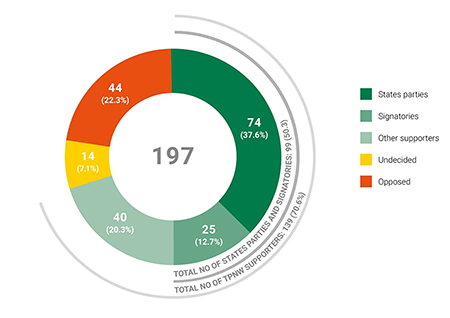"I want to tell you that your fact sheet on the [Missile Technology Control Regime] is very well done and useful for me when I have to speak on MTCR issues."
Nuclear Ban Treaty Crosses Majority Threshold
November 2025
A majority of the world’s countries—99 states—have now signed, ratified, or acceded to the Treaty on the Prohibition of Nuclear Weapons (TPNW), following Kyrgyzstan’s signature and Ghana’s ratification of the treaty Sept. 26.

The TPNW prohibits states from developing, testing, or acquiring nuclear weapons. It was adopted July 7, 2017, and entered into force Jan. 22, 2021. Currently, 95 states have signed the treaty and 74 have subsequently ratified and become states-parties. Four countries acceded to the treaty without signing beforehand. No nuclear-armed state has become a member.
Kyrgyzstan announced its decision to join the TPNW at an Apr. 30 meeting of the third preparatory committee of the review conference for the nuclear Nonproliferation Treaty.
“Kyrgyzstan firmly supports the efforts of the international community to achieve a world free of nuclear weapons,” the delegation’s statement said. “We are committed to ensuring future generations live without the threat posed by weapons of mass destruction.”
Ghana signed the TPNW in September 2017. It participated in the first meeting of states-parties and the Africa Regional Seminar on the TPNW, both in 2022. At the third meeting of states-parties to the TPNW in March, Ghana stated its commitment to ratify the treaty, noting its role as a proponent of the Pelindaba Treaty, which created a nuclear-weapon-free zone in Africa.
The first review conference for the TPNW will take place Nov. 30 to Dec. 4, 2026, in New York; South Africa will preside.—LIPI SHETTY
